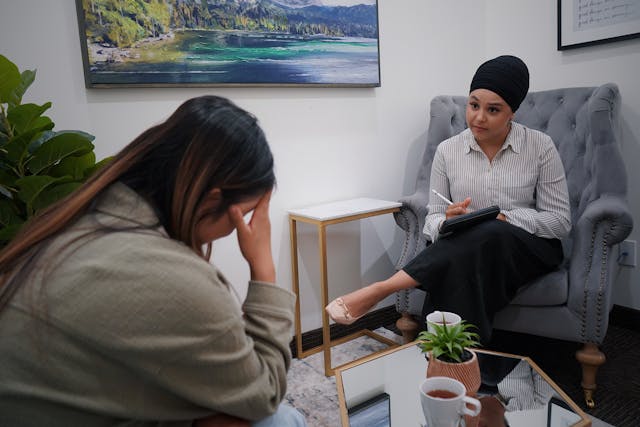What common challenges do LGBTQ people face?
LGBTQ individuals often encounter systemic barriers that impact various aspects of their lives. Below are the most common challenges they face:
Discrimination based on sexual orientation or gender identity
The LGBTQ community frequently experiences discrimination based on their sexual orientation or gender identity, leading to exclusion from opportunities and services that other minority groups may access more readily.
Socioeconomic barriers and limited financial support
Many LGBTQ people including LGBTQ youth across different age groups, face socioeconomic challenges with limited financial support, which can restrict access to essential services and even mental health resources.
Inadequate access to comprehensive healthcare
Challenges in obtaining comprehensive healthcare, including mental health services, mental health care, and addressing mental health concerns, are common due to discrimination and insufficient provider training on issues related to orientation or gender identity and sexual orientation or gender. This leaves individuals at particular risk and potentially exacerbating existing mental health challenges (Mirza & Rooney, 2018).
Social exclusion and stigmatization
Social stigma and marginalization in diverse situations, particularly among underprivileged communities, may impede access to community support and financial help, affecting broader efforts such as suicide prevention.
Barriers to accessing supportive programs and community resources
Programs aimed at providing mental health support and addressing issues such as substance abuse are frequently underfunded, with more LGBTQ people not receiving the individualized care they require. The cumulative effect of these systemic challenges can contribute to poor mental health outcomes and potentially increase the risk of developing a mental health disorder.
Common mental health issues they deal with
LGBTQ individuals often experience a range of mental health issues, influenced by systemic discrimination and a lack of adequate mental health support. Here are some mental health issues they have to deal with:
Depression and anxiety
LGBTQ people, particularly young people and LGBTQ youth from marginalized communities and across various age groups frequently report depression and anxiety, mental health concerns that are exacerbated by discrimination related to sexual orientation and gender identity. Studies indicate that they are at higher risk for poor mental health outcomes, emphasizing the need for robust mental health services and mental health care (King et al., 2008).
Substance abuse and addiction
In response to chronic stress and social exclusion, many LGBTQ individuals turn to substance abuse, which can evolve into a mental health disorder; insufficient mental health resources and limited financial support leave these individuals at particular risk, underscoring the importance of integrated mental health services (McCabe et al., 2010).
Suicidal ideation and self-harm
Due to a combination of isolation, stigma, and the compounded effects of other mental health challenges, suicidal ideation is a critical issue among LGBTQ populations. Effective suicide prevention requires comprehensive mental health support and mental health care that addresses both sexual orientation or gender and orientation or gender identity.
Trauma and stress-related disorders
Experiences of discrimination, harassment, and systemic marginalization contribute to chronic stress and trauma-related disorders in LGBTQ individuals. These mental health challenges demand mental health services that are attuned to issues of gender identity and sexual orientation (Hatzenbuehler, 2009).
Eating disorders and body image issues
Eating disorders represent another mental health disorder prevalent among LGBTQ individuals, often linked to pressures surrounding body image and identity. The interplay between mental health concerns and the challenges of being part of other minority groups calls for targeted mental health resources and support that also consider financial support needs.
What treatments can mental health professionals provide them?
Effective treatment modalities for LGBTQ mental health issues encompass a range of evidence-based interventions that address both general mental health concerns and challenges related to sexual orientation or gender, ensuring culturally sensitive mental health care.
Individual psychotherapy
Individual psychotherapy offers a personalized approach to mental health care by helping LGBTQ people, whether young people, LGBTQ youth, or adults, process feelings of depression, anxiety, and poor mental health that may arise from discrimination, fear, or even experiences of being physically attacked.
This intervention is particularly crucial for most people who face a mental health disorder related to their sexual orientation or gender identity.
Group therapy and peer support
Group therapy creates a space for members of the LGBTQ community to build support systems with friends and peers, facilitating mental health support that complements individual care while addressing mental health challenges. By fostering peer support, clinicians can help counteract isolation and promote suicide prevention in marginalized communities and other minority groups across various age groups.
Family therapy
Family therapy involves working with family members to improve understanding and communication regarding sexual orientation or gender, helping to bridge gaps between LGBTQ individuals and their loved ones. This form of intervention provides mental health resources and mental health services that can alleviate mental health concerns and reduce the risk of suicidal thoughts among those who feel unsupported at home.
Gender-affirming care
Gender-affirming care is critical for transgender people and trans individuals experiencing gender dysphoria, as it validates their gender identity and offers specialized mental health support. By integrating gender-affirming practices into mental health services, professionals can help reduce mental health issues and improve overall mental health outcomes, ensuring that those facing anti-LGBTQ discrimination receive positive impact care.
Crisis intervention and suicide prevention
Crisis intervention strategies and suicide prevention initiatives, often in collaboration with organizations such as the Trevor Project, are essential for addressing acute mental health issues, especially when LGBTQ individuals feel suicidal or have experienced substance abuse or substance misuse. Timely mental health support and coordinated health care interventions can mitigate the higher risk of suicide and mental health challenges triggered by severe stress or violence.
Integrated treatment for co-occurring issues
Integrated treatment models that address both mental health issues and co-occurring challenges such as substance abuse, financial stress, and other factors affecting poor mental health are vital for LGBTQ people.
These treatments, when tailored to the unique needs of LGBTQ people, can have a transformative and positive impact on mental health support, ensuring better access to mental health services and resources while reducing the mental health concerns associated with discrimination, violence, and isolation.
Materials for professionals to learn more about the LGBTQ community
For healthcare professionals seeking to enhance their cultural competence and understanding of the LGBTQ community, the following resources provide evidence-based guidelines, research, and training materials.
- The Fenway Institute & National LGBT Health Education Center: Offers comprehensive resources, training modules, and research findings on LGBTQ health and culturally competent care.
- GLMA (Health professionals advancing LGBTQ equality): Provides best practice guidelines, webinars, and networking opportunities tailored for healthcare providers serving the LGBTQ community.
- American Psychological Association (APA) guidelines: Features evidence-based practice guidelines for working with LGBTQ clients, including considerations for sexual orientation, gender identity, and gender expression.
- World Professional Association for Transgender Health (WPATH) Standards of Care: An essential resource for understanding gender-affirming care and best practices in treating transgender individuals and those with gender dysphoria.
Main takeaways
LGBTQ mental health is affected by discrimination based on sexual orientation or gender identity, placing young people, LGBTQ youth, and adults from marginalized communities at particular risk for depression, anxiety, and poor mental health. At the same time, nearly half have experienced mental health challenges that may include substance abuse and financial stress.
Comprehensive mental health support including access to culturally competent mental health services, gender-affirming care for transgender people, peer support, and family involvement is essential for mitigating these issues, reducing suicidal thoughts, and ensuring a positive impact on life outcomes, as evidenced by initiatives like the Trevor Project and research highlighting the higher risk of mental health disorders among other minority groups.
References
Hatzenbuehler, M. L. (2009). How does sexual minority stigma “get under the skin”? A psychological mediation framework. Psychological Bulletin, 135(5), 707–730. https://doi.org/10.1037/a0016441
King, M., Semlyen, J., Tai, S. S., Killaspy, H., Osborn, D., Popelyuk, D., & Nazareth, I. (2008). A systematic review of mental disorder, suicide, and deliberate self harm in lesbian, gay and bisexual people. BMC Psychiatry, 8(1), 70. https://doi.org/10.1186/1471-244X-8-70
McCabe, S. E., Bostwick, W. B., Hughes, T. L., West, B. T., & Boyd, C. J. (2010). The Relationship Between Discrimination and Substance Use Disorders Among Lesbian, Gay, and Bisexual Adults in the United States. American Journal of Public Health, 100(10), 1946–1952. https://doi.org/10.2105/ajph.2009.163147
Mirza, S. A., & Rooney, C. (2018, January 18). Discrimination prevents LGBTQ people from accessing health care. Center for American Progress. https://www.americanprogress.org/article/discrimination-prevents-lgbtq-people-accessing-health-care/




.jpg)

.jpg)
.jpg)
.jpg)


.jpg)

.jpg)

.jpg)


.jpg)





.jpg)

.jpg)
.jpg)